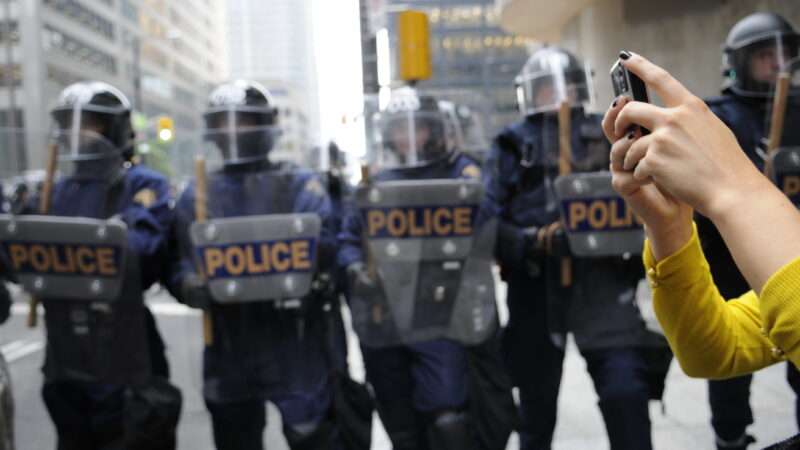
Police, questioned over tactics and culturally besieged not too long ago, find themselves with renewed cachet amidst concerns over crime and campus chaos. That means leverage to win themselves leeway in how they go about their jobs—pushing, for instance, laws that restrict the public's right to record cops making arrests, with Florida the latest jurisdiction to enact such a bill. That pleases fans of law enforcement, but it reduces accountability for an armed and often abusive arm of government.
Florida Proudly Supports Police Unaccountability
"I was proud to sign legislation today to ensure law enforcement officers can serve our communities without worrying about harassment from anti-police activists," Florida Gov. Ron DeSantis announced April 12. "We will continue to take action to ensure Florida remains the friendliest state in the nation for law enforcement officers."
The two bills DeSantis signed that day certainly go a long way towards making the state very friendly to cops. H.B. 601 guarantees that police departments will control oversight boards that investigate their conduct. S.B. 184, in line with "buffer" legislation in other states intended to impede recording of law-enforcement activity, lets police order members of the public to remain at least 25 feet distant under threat of arrest.
"We appreciate the importance of protecting first responders but are concerned that the bill prevents citizens from going near or filming first responders within 25 feet if told not to approach," noted the state's First Amendment Foundation, which urged DeSantis to veto the legislation. "This bill would undermine citizen journalists and could allow for undocumented police misconduct."
Lawmakers and DeSantis made much of the threat posed by citizens who "harass" and "threaten" police, and indeed we've seen some of that at anti-Israel protests around the country. But agitators already blocking bridges or occupying buildings are unlikely to be deterred by yet one more law. The real targets will be people upsetting cops by recording them at inconvenient moments.
A History of Bad Behavior out of Public View
"Back in 2013, near 33rd and Seward, video shows a confrontation between police and a local family escalated," Alex Whitney reported in February for Omaha's KMTV. "The camera shows officers throwing a man to the ground and start beating him. Officers rushed inside the [family's] home and started seizing and destroying the phones of family members who recorded the incident. A neighbor captured video of the confrontation, which led to a lawsuit and termination of four officers."
KMTV brought up that story as Nebraska legislators considered L.B. 1185, a bill that, like the new Florida law, would set up a buffer zone around police. The Nebraska bill, which hasn't passed, created only a 10-foot zone around officers from which they could exclude members of the public. Even so, as the news report pointed out, "courts across the country have long ruled that outlawing recording [on-duty] officers in public is a violation of the First Amendment" and the Nebraska bill, like the even more restrictive Florida law, is unlikely to pass constitutional muster. That's especially true since an Arizona law with an even smaller buffer zone failed to survive constitutional challenge.
First Amendment Right To Record
Arizona's 2022 law prohibited "a person from knowingly making a video recording of a law enforcement activity within eight feet of where the law enforcement activity is occurring without permission from a law enforcement officer." The size of the buffer made no difference to the court, which focused on the exclusion.
"There is a clearly established right to record law enforcement officers engaged in the exercise of their official duties in public places," wrote U.S. District Judge John J. Tuchi in the course of issuing a permanent injunction on First Amendment grounds. "The statute cannot withstand intermediate scrutiny because the law prohibits or chills a substantial amount of First Amendment protected activity and is unnecessary to prevent interference with police officers given other Arizona laws in effect."
The Florida law, which passed with substantial support from Republicans and Democrats alike, may seek to escape such scrutiny by not specifically mentioning "recording" but instead barring approaching within 25 feet to impede, interfere, threaten, or harass officers. However, lawmakers constantly focused on recording and rejected an alternative bill that specified "peaceful audio or video recording or eyewitness observing of a first responder is a legitimate purpose that does not constitute harassment."
Under the circumstances, it will be difficult for the state to pretend the law isn't meant to prohibit recording first responders within a boundary far larger than that ruled unconstitutional elsewhere.
An exception to the general trend of protecting the public's right to record is a January federal court ruling on a 2023 Indiana law similarly establishing a 25-foot buffer zone around police. In that case, U.S. District Court Judge Damon Leichty denied a motion for a permanent injunction, writing that the law "has only an incidental effect on the public's First Amendment right to capture audio and video and otherwise to scrutinize police conduct."
Leichty's ruling contradicts other decisions, such as the one in Arizona, and is under appeal.
Florida officials undoubtedly hope their law similarly survives challenge. That likely explains why it has been tweaked to resemble the Indiana bill in both the size of the buffer and in not specifically mentioning the recording of police officers in action.
But the challenge to the Indiana law came from somebody recording cops, and Florida lawmakers endlessly discussed documentation of police activity for good reason; police and their supporters don't like it when police are recorded doing their jobs and, sometimes, misbehaving. After all, if officials were really concerned about the public impeding, interfering with, threatening, or harassing officers, they might encourage enforcement of the many laws that already criminalize those things.
Bad Laws With a Lousy Track Record
When a 2021 law with a 20-foot buffer passed in Miami Beach, points out the ACLU of Florida, it was suspended after a single month of enforcement. Of the 13 people arrested under the law, eight were filming police. "Five officers were charged with battery" for their conduct in enforcing the law. "One officer entered a guilty plea and retired, one officer was found guilty by a jury, and one officer is still awaiting trial."
Come to think of it, enforcing a buffer zone against those recording the police might not work out so well for cops after all. Government officials should just drop the whole idea.
The post Even If You Support Police, Don't Ban People From Recording Them appeared first on Reason.com.
 Psst! Do you accept cookies?
Psst! Do you accept cookies?
What's your thoughts?
Please Register or Login to your account to be able to submit your comment.